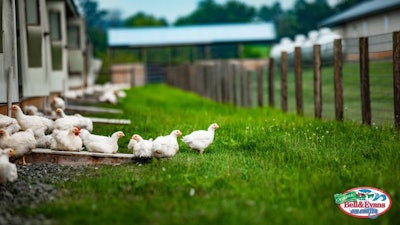
The organic chicken market in the United States is growing quickly and is poised for further growth in the coming decade.
Powered by increased demand for organic chicken, sales in the segment are growing significantly. According to the U.S. Department of Agriculture’s (USDA) National Agricultural Statistics Service’s (NASS) 2019 Census of Agriculture, total organic sales were $9.926 billion, a 31% increase from the $7.554 billion sold in 2016.
In 2019, sales of organic chicken were $1.115 billion, a 48% increase from the $750 million sold in 2016. For turkey, organic sales were $139 million in 2019, an increase of 67% from $83 million in 2016.
Scott Sechler, president and owner of Bell & Evans, a leading producer of organic chicken in the U.S., said demand for organic poultry rose sharply during the COVID-19 pandemic. He projects demand will increase by more than 10% every year for the rest of the decade. This trend, he said, is driven by consumers demanding greater trust in the quality of their food.

From left: Margot Sechler, Scott Sechler and Scott Sechler Jr., Bell & Evans. (Courtesy Bell & Evans)
Organic poultry production
Organic chicken is a specialty product certified by the USDA to follow certain practices that are not standard to the integrated poultry industry. They are marketed to consumers who want a premium product aligned with the organic food ethos. Organic poultry products cost consumers about twice as much as conventionally produced chicken and cost about twice as much to produce.
To be sold as organic, chicken and turkeys produced in the U.S. must align with the standards set by the USDA’s National Organic Program (NOP) and bear the USDA Organic stamp on the packaging. Enforcement of the NOP began in 2000. This requires birds be raised with no antibiotics, fed only organic, vegetarian feed and supplements and provided access to the outdoors. The program specifically sets standards for land use, origin of livestock, feeding, health care, living conditions, soil erosion and water quality, egg and carcass washes, slaughter, marketing and labeling, and recordkeeping.

To be sold as organic, chicken must be raised to the standards of the U.S. Department of Agriculture’s organic program and bear the organic product seal. (Courtesy Shenandoah Valley Organic LLC)
Figures provided by the USDA Agricultural Marketing Service (AMS) on organic poultry slaughtered under federal inspection indicate organic poultry production grew steadily in the past decade. In 2020, 6.56 million pounds of ready-to-cook (RTC) organic chicken was produced on a weekly basis. That’s a 202% increase from the 2.17 million pounds RTC organic chicken produced in 2010.
For turkeys, organic production has increased by more than 500% in the same period. In 2020, 108.1 million pounds of live organic turkeys were processed in the U.S. In 2010, 17.62 million pounds of live organic turkeys were produced.
organic-broiler-production-table
The average weekly slaughter of organic chicken grew by 202.3% in a decade. (U.S. Department of Agriculture Agricultural Marketing Service)
organic-turkey-production-table
Organic turkey production increased by more than 500% between 2010 and 2020. (U.S. Department of Agriculture Agricultural Marketing Service)
By comparison, a total of 964.74 million pounds of ready-to-cook chicken was produced on a weekly basis in 2020 by the 32 integrated poultry companies forming the WATT PoultryUSA’s Top Broiler Companies index. In 2020, a total of 2.247 billion pounds of live turkeys were slaughtered by the 22 companies in WATT PoultryUSA’s Top Turkey Companies index. Cumulatively, organic production accounts for just 0.67% of that chicken production and 4.8% of that turkey production.
Organic economics
Organic chicken production generally costs twice as much as conventional production, largely due to the requirement for organic-certified grain to be fed to the birds. Organic-certified grain and feed ingredients are, compared with conventional products, in short supply. A vast majority of organic grain in the country is imported.
Farmers Pride Inc., doing business as Bell & Evans, is a leading producer of organic chicken. It started producing organic in 2009 and is the largest chicken supplier for Whole Foods Market. According to its response to the 2020 Top Broiler Companies survey, the company produces 4.8 million pounds of ready-to-cook chicken, by processing 1.25 million chickens, weekly. About half of its production is organic.
Sechler, a poultry entrepreneur who formed the Bell & Evans brand by purchasing the assets of local poultry companies in southeastern Pennsylvania in the 1980s, said in the early days of organic chicken production it was not a profitable business due to often producing more organic meat than was sold and selling the remaining meat at a loss. Demand is now so great there is even a market for organic poultry byproducts. He also noted demand from retail has risen over the years, while foodservice demand dipped, due to stronger consumer demand through that channel.
Organic carries higher costs across the board – and costs are passed onto the consumer – but organic production is profitable now for Bell & Evans and, he suspects, for other organic producers, too.
“I wouldn't say there's a lot more money to be made in organic than something else. But I think it's a very consistent market,” Sechler said. “The margins for us are consistent.”
Largest integrators' organic programs
Three of the top five integrators included in the WATT PoultryUSA database – Tyson Foods Inc., Pilgrim’s Pride Corp. and Perdue Foods – are producing organic chicken through assets they acquired in the past and through their own organic programs.
Tyson
Tyson, the largest integrated chicken company in the country, purchased an organic producer, Tecumseh Poultry LLC, in June 2018 for an undisclosed amount. At the time of the transaction, Tyson said Tecumseh, which sold products under the Smart Chicken brand, was a leading producer of organic chicken.
According to WATT Global Media research, Tecumseh was producing 2.62 million pounds RTC chicken on a weekly basis in 2017. It is unknown how much was organic production and how that figure has changed since the 2018 transaction.
Tyson declined to provide its organic production figures to WATT PoultryUSA. The publicly traded company does not publish organic production data in its U.S. Securities and Exchange Commission (SEC) documents.
Pilgrim’s
Pilgrim’s Pride, the second largest chicken company, sells organic products under its just BARE product line. The just BARE line was originally launched by GNP Co., which Pilgrim's agreed to purchase from The Maschhoffs for $350 million in 2016. According to WATT PoultryUSA data, GNP Co. processed 8.79 million pounds of ready-to-cook chicken on a weekly basis in 2015. GNP launched its organic production in 2014. It is unknown what portion of its production at that time was organic.
In May 2016, Pilgrim’s then-CEO Bill Lovette said Pilgrim's intended to enter the organic chicken market and planned on converting one of its complexes to produce organic chicken due to forecasted increase in demand. At the time, he said once the conversion was completed Pilgrim’s would produce about 20% of the organic chicken in the country.
It is unknown how much of Pilgrim’s production is organic today. The publicly traded company does not publish organic production data in its SEC documents. Representatives of the company did not immediately respond to a request for comment on this article.
Perdue

Perdue Farms says it’s the largest producer of organic chicken in the U.S. (Courtesy Perdue Farms)
Perdue, the fourth largest chicken company, says it is the largest producer of organic chicken in the U.S., but it declined to provide specific data on its organic production to WATT PoultryUSA, citing its policy to not typically release those figures.
In 2011, Perdue acquired Coleman Natural Foods, an organic poultry producer, for an undisclosed amount. Perdue sells organic products under its Perdue Simply Smart Organics, Coleman Organic, Petaluma Poultry’s Rosie, and Draper Valley Farm’s Roxy brands.
In a 2016 statement Perdue provided to the USDA’s National Organic Program – signed by Mike Leventini, Perdue’s general manager and vice president of live production and the vice president of Coleman Natural Foods – the company said it has sold organic broiler chickens since 2001 through the Petaluma Poultry, Draper Valley Farms and Perdue brands. It said it was the largest organic-certified broiler producer in the U.S. with operations in California, Washington and Delaware. According to the statement, in 2014, Perdue estimated it produced half of the organic chicken in the U.S.
In 2018, the company said in a press release that its Milford, Delaware, processing plant supplied 1.2 million organic and no-antibiotics-ever chickens per week for sale under Perdue, Perdue Harvestland, Coleman Organic and private label brands.
Also in 2018, Perdue announced two organic-related investments. In April 2018, it said it planned a $42 million expansion of its cook plant in Perry, Georgia, which would help meet growing demand for organic products. In November 2018, the company owned a $30 million organic grain receiving and storage facility in Baltimore County, Maryland, to meet demand for organic feed ingredients for Perdue and other companies in the region.
Leading organic chicken producers
Bell & Evans

Bell & Evans plans on opening a new $330 million, 411,500-square-foot organic-certified processing plant in 2021. (Courtesy Bell & Evans)
Bell & Evans began organic production in 2009 and about half of its production is organic. The company is known for higher than standard live production practices, including inclusion of natural light and concrete floors in all barns and changing litter between every flock. It discontinued use of antibiotics in 1998.
Bell & Evans says it is the only operator of an organic-certified hatchery. The facility can hatch as many as 2.8 million organic eggs weekly. The company is building a new $330 million, 411,500 square-foot, organic-certified processing plant. It will double its production capacity and should be operational by the end of 2021. Half of the plant’s production will be organic. In the next decade, the company plans to build a second new plant with one dedicated to processing organic chicken going forward.
He said customers across the country are ordering more chicken every week and, to keep up with demand, Bell & Evans will need to keep growing capacity. Bell & Evans uses only uses organic grain grown in the U.S. and is supplied entirely by Cargill Inc.
Shenandoah Valley Organic

Corwin Heatwole Farmer Focus
Corwin Heatwole, Shenandoah Valley Organic LLC (Lise Metzger)
Shenandoah Valley Organic LLC (SVO) is a start-up poultry processor based in Harrisonburg, Virginia, that processes only organic birds it purchases from farmers growing in the Shenandoah Valley region of Virginia. According to its 2020 WATT PoultryUSA Top Broiler Companies survey response, it produced 1.9 million pounds of RTC chicken on a weekly basis in 2020. It sells its products under the Farmer Focus brand.
The company was founded in 2012 by its CEO Corwin Heatwole. It processes birds out of a rehabilitated, 90,000 square-foot former turkey plant it purchased from investors in 2014. In 2019, it raised $15 million from private investors to grow the company. In November 2020, SVO announced its plans to build a new, 75,000-square-foot processing plant in Harrisonburg.
In a 2019 interview with WATT PoultryUSA, Heatwole said the next steps in growing the company include rolling out value-added and cooked products and expanding its retail presence.
Foster Farms
Foster Farms is a privately owned, vertically integrated chicken and turkey company producing organic chicken and organic turkey. According to WATT PoultryUSA’s Top Poultry Companies data, it ranks as the 11th largest chicken company in the U.S. in terms of weekly RTC chicken production and the 13th largest turkey producer. It is based in California and operates in Oregon, Washington, Colorado, Arkansas, Alabama and Louisiana.
In its 2020 Top Broiler Company survey response, the company said it produces organic products but did not say what percentage of its production is organic. The company launched its organic chicken and turkey lines in 2015 when also launching its antibiotic-free brand. In 2016, it was reportedly planning on building a $15.8 million feed mill to process organic feed. The company did not respond to a request for comment on this article.
Miller Poultry
Miller Poultry is a privately owned, integrated chicken producer based in Orland, Indiana. It processes vegetarian-fed, raised-without-antibiotics broilers raised on Amish family farms.
According to its 2020 Top Broiler Companies survey response, Miller Poultry produced 3.25 million pounds of RTC chicken on a weekly basis in 2020. It said 20% of its production, or about 650,000 pounds RTC on a weekly basis, is organic.
Bell & Evans grows in organic, specialty poultry www.WATTPoultry.com/articles/38851


















